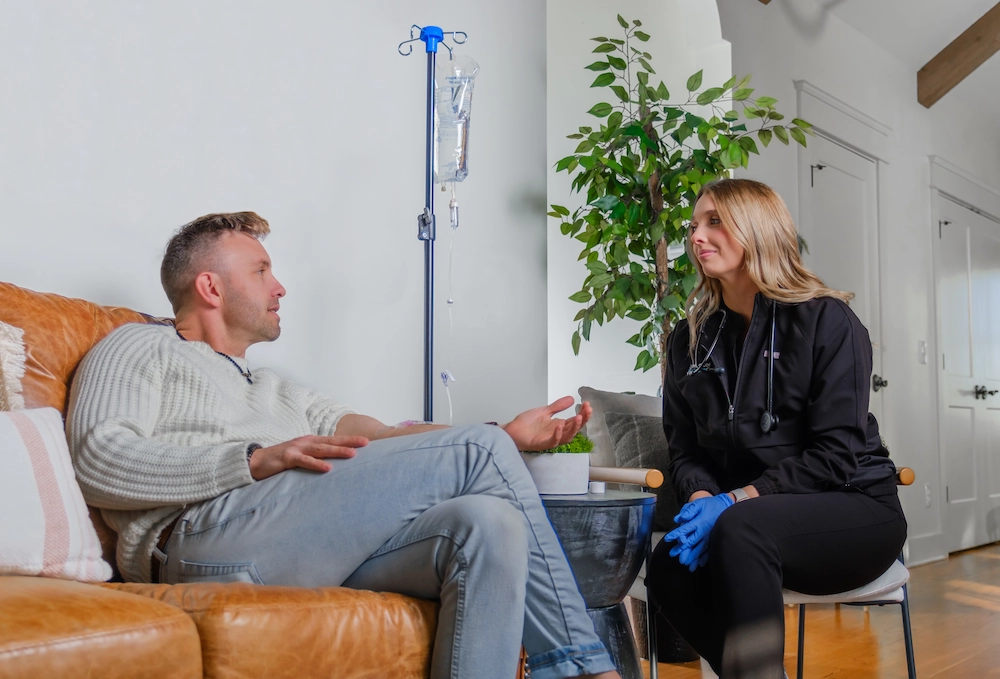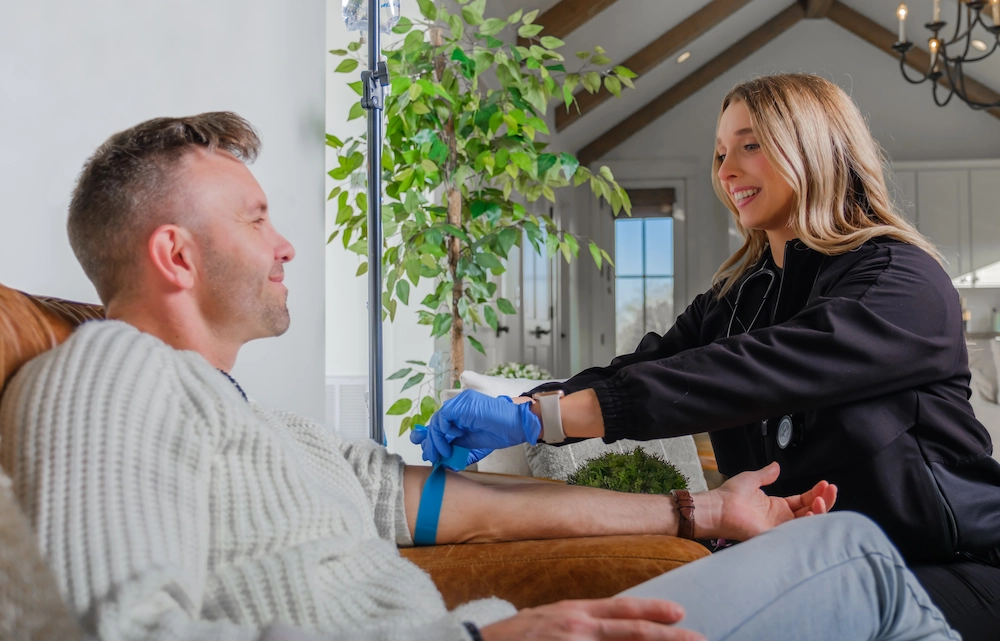Table of Contents
Speed Up Dehydration Recovery: What to Expect
Dehydration disrupts the balance of electrolytes and impairs physiological functions. It can strike unexpectedly, whether from intense exercise, hot weather, or illness. The time it takes to bounce back depends on its severity and the methods used.
In this guide, Medical House Calls will look to answer the question: how long does it take to recover from dehydration. We’ll explore the recovery time for mild, moderate, and severe dehydration, provide effective rehydration techniques, and highlight when to seek medical attention. Knowing the appropriate steps can make all the difference in how quickly you feel better.

Recharge with At-Home IV Therapy
Definition of Dehydration
Dehydration occurs when the body loses more fluids than it absorbs, leading to an insufficient amount of water to carry out bodily functions. It can affect people of all ages but is precarious for children, older adults, and individuals with certain medical conditions.
Causes
- Insufficient Fluid Intake: Not drinking enough water, especially in hot weather or during exercise.
- Excessive Fluid Loss: Losing a lot of fluids through sweating, vomiting, diarrhea, or urination.
- Illness: Fever, heatstroke, or infections can increase fluid loss.
- Medications: Diuretics and certain other medications can increase urine output.
- Chronic Conditions: Diabetes and kidney disease can cause dehydration.
Symptoms
Mild to Moderate Dehydration:
- Dry mouth and throat
- Thirst
- Dark yellow urine
- Decreased urine output
- Headache
- Dizziness or lightheadedness
- Nausea
- Fatigue
- Dry skin
Severe Dehydration:
- Parched mouth and mucous membranes
- Amber-colored urine
- Little or no urine output
- Rapid heart rate and breathing
- Sunken eyes
- Low blood pressure
- Confusion or irritability
- Lack of sweating
- Fever
- Loss of consciousness
Severity
- Mild Dehydration: Involves a fluid loss of about 1-2% of body weight. Symptoms are often manageable and can be reversed by drinking fluids.
- Moderate Dehydration: Involves a fluid loss of about 3-5% of body weight. Symptoms can affect physical and cognitive performance.
- Severe Dehydration: Involves a fluid loss of 6-9% or more of body weight. This is a medical emergency as it can lead to kidney failure, seizures, or fatalities.
Prevention
- Drink adequate amounts of water, especially in hot weather or during physical activity.
- Eat water-rich foods like fruits and vegetables.
- Monitor urine color as an indicator of hydration status.
- Avoid alcohol and caffeine intake, as they can lead to increased fluid loss.
Recovery Time Based on Severity
Mild Dehydration
- Timeframe: A few hours to a day.
- Approach: Rehydration can be achieved by drinking water or other fluids, such as rehydration solutions. Consuming water-rich foods like fruits and vegetables can also help. Reducing physical activity and staying cool can speed up recovery.
Moderate Dehydration
- Timeframe: 1 to 2 days.
- Approach: Rehydration involves drinking more fluids, including water, oral rehydration solutions, and electrolyte-rich beverages. In some cases, medical supervision might be required to ensure proper electrolyte balance, especially if the dehydration was caused by illness. Rest and avoiding strenuous activities are essential during recovery.
Severe Dehydration
- Timeframe: Several days to a week.
- Approach: Severe dehydration often requires medical intervention. Intravenous (IV) fluids are administered to restore fluid and electrolyte balance. Monitoring in a healthcare setting might be necessary to address complications and ensure proper recovery. Once the patient stabilizes, oral fluids and a balanced diet will be reintroduced.

Tips for Accelerating Recovery
- Hydrate Gradually: Avoid drinking large amounts of water at once to prevent potential imbalances.
- Electrolyte Balance: Consume fluids that contain electrolytes to replace lost sodium.
- Rest: Recover by minimizing physical exertion.
- Medical Supervision: Follow medical advice and treatment plans, especially for moderate to severe dehydration.
- Monitor Symptoms: Seek medical assistance if symptoms worsen.
Factors Affecting Recovery Time
Recovery time from dehydration can vary depending on the person’s health, age, and the cause of dehydration. Underlying medical conditions, such as kidney disease or diabetes, can prolong recovery. The speed and adequacy of rehydration efforts also play a critical role. Environmental conditions like heat and humidity and the individual’s activity level during recovery can influence the duration.
Effective Rehydration Techniques
Importance of Electrolytes
Sodium, potassium, and chloride are crucial for maintaining fluid balance and proper cellular function. During dehydration, the body loses electrolytes through sweat, urine, and other bodily fluids. Replenishing these electrolytes is essential for adequate rehydration. Drinks like oral rehydration solutions, sports drinks, and electrolyte tablets can restore electrolyte balance and ensure proper hydration.
Dietary Considerations
Water-rich foods like fruits (e.g., watermelon, oranges) and vegetables (e.g., cucumbers, lettuce) can aid in rehydration and supply essential vitamins and minerals. Avoiding caffeine and alcohol, which can increase fluid loss, is also vital. A balanced diet that includes foods high in electrolytes, such as bananas (potassium), yogurt (calcium), and leafy greens (magnesium), supports hydration and wellness.
Intravenous Fluids for Severe Cases
For severe dehydration, intravenous (IV) fluids may be necessary. IV fluids are administered into the bloodstream, allowing for rapid rehydration and electrolyte replenishment. This method is helpful in cases of severe dehydration caused by illness, heatstroke, or other medical emergencies. IV therapy can restore fluid balance and stabilize the patient, reducing the risk of complications.
Preventing Dehydration
- Stay Hydrated: Drink adequate amounts of water throughout the day, especially during hot weather or physical activity.
- Monitor Fluid Loss: Pay attention to signs of dehydration, such as dark urine, dry mouth, and dizziness, and increase fluid intake accordingly.
- Balanced Diet: Include water-rich foods and foods high in electrolytes.
- Avoid Dehydration Triggers: Limit consumption of diuretics like caffeine and alcohol.
- Prepare for Activities: Carry water and electrolyte drinks during exercise or outdoor activities, and take regular breaks to hydrate.
When to Seek Medical Attention
Seek medical attention if you or someone else experiences extreme thirst, very dry mouth and skin, little or no urine output, rapid heartbeat, sunken eyes, or confusion. Persistent vomiting, diarrhea lasting more than 24 hours, or a high fever warrants immediate medical care. In infants and young children, signs like lack of tears when crying, no wet diapers for several hours, or drowsiness require prompt medical evaluation.
If dehydration is suspected to be caused by an underlying medical condition or if home rehydration efforts do not improve symptoms, it’s crucial to consult a healthcare professional.
Medical House Calls Offers Mobile IV Therapy
Dehydration is a common but serious condition that can result from various causes and manifests through symptoms ranging from mild thirst to confusion and low urine output. Recovery time varies, with mild cases resolving within hours and critical cases taking several days and requiring medical intervention.
Effective rehydration techniques, including electrolyte solutions, water-rich foods, and IV fluids for severe cases, are crucial for a swift recovery. Preventing dehydration through adequate hydration, a balanced diet, and monitoring of fluid loss is imperative for maintaining health.
Medical House Calls offers mobile IV therapy services with an extensive menu that includes all the vitamins, electrolytes, antioxidants, and NAD+. Whether you need IV therapy at home, the office, or elsewhere, we come to you with all the necessary supplies. Text or call us to book a same-day or next-day appointment.
Unlock Vitality with NAD+ Therapy











